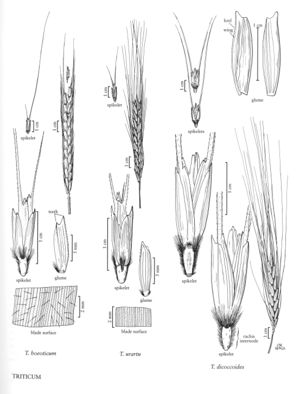Difference between revisions of "Triticum dicoccoides"
imported>Volume Importer |
imported>Volume Importer |
||
| (2 intermediate revisions by 2 users not shown) | |||
| Line 31: | Line 31: | ||
|basionyms= | |basionyms= | ||
|family=Poaceae | |family=Poaceae | ||
| − | |illustrator=Cindy Roché;Hana Pazdírková; | + | |illustrator=Cindy Roché;Hana Pazdírková;Christine Roberts |
|illustration copyright=Utah State University | |illustration copyright=Utah State University | ||
|reference=None | |reference=None | ||
| Line 37: | Line 37: | ||
|publication year= | |publication year= | ||
|special status= | |special status= | ||
| − | |source xml=https:// | + | |source xml=https://bitbucket.org/aafc-mbb/fna-data-curation/src/200273ad09963decb8fc72550212de541d86569d/coarse_grained_fna_xml/V24/V24_386.xml |
|subfamily=Poaceae subfam. Pooideae | |subfamily=Poaceae subfam. Pooideae | ||
|tribe=Poaceae tribe Triticeae | |tribe=Poaceae tribe Triticeae | ||
Latest revision as of 16:23, 11 May 2021
Culms to 100 cm, decumbent; nodes glabrous or puberulent; internodes mostly hollow, solid for 1 cm below the spikes. Blades 4-6 mm wide, pubescent. Spikes to 10 cm, wider than thick; rachises densely hairy at the nodes and margins; internodes 3-8 mm; disarticulation spontaneous, dispersal units wedge-shaped. Spikelets 15-25 mm, oblong to rectangular, with 3 florets, usually the lower 2 seed-forming. Glumes 10-15 mm, coriaceous, tightly appressed to the lower florets, 2-keeled, prominent keel winged to the base, 2-toothed, second tooth poorly developed; lemmas 10-15 mm, awned, awns on the lower 2 lemmas to 15 cm, on the third lemma to 2 cm; paleas not splitting at maturity. Endosperm flinty. Haplomes AuB. 2n = 28.
Discussion
Triticum dicoccoides is the wild counterpart of T. dicoccum, and is an ancestor of both T. durum and T. aestivum. Morphologically, it is almost indistinguishable from T. araraticum Jakubz., a wild tetraploid that differs from T. dicoccoides in combining the Ab and G haplomes. Triticum dicoccoides is native to the Fertile Crescent. Its distribution overlaps that of T. araraticum in the northern and eastern portions of the region.
Selected References
None.
